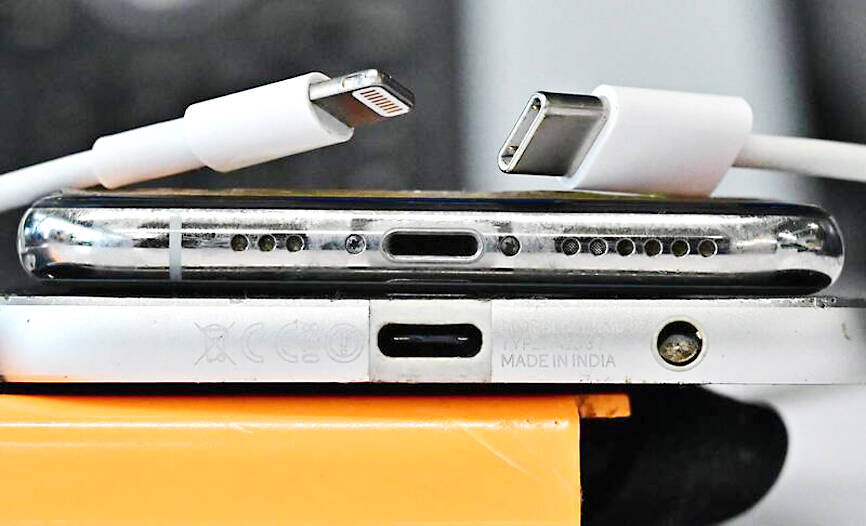The National Communications Commission’s (NCC) is to follow the EU’s lead on making charging via USB-C port mandatory for all new phones, to ensure consumers’ convenience and electronic waste reduction, the agency’s annual legislative plan shows.
The EU lawmakers last year voted to adopt a directive to make the USB-C port for wired charging mandatory on all future smartphones sold in the bloc, including new iPhones, effective from Dec. 28 next year.
The NCC has previewed its legislation plan and inventory of regulations, including the planned amendment to the Technical Specifications for Mobile Telecommunications Terminal Equipment (行動通信終端設備技術規範), in accordance with the EU’s newly adopted directive.

Photo: AFP
The amendment is expected to be proposed in June next year and promulgated in December next year.
NCC Department of Infrastructure section head Hsieh Chih-chang (謝志昌) yesterday said that as the EU is to implement the new directive regarding the use of USB-C port from Dec. 28 next year, the NCC would follow the EU’s lead to be in line with the international standards and all telecommunication terminal equipment in Taiwan would be required to pass the council’s examination.
Having a universal charging port has two advantages: the convenience of the consumers and reducing electronic waste, Hsieh said.
The NCC’s telecommunication terminal equipment examinations has three levels: telecom interface, electromagnetic compatibility and electrical safety, Hsieh said, adding that bad quality cables could pose a fire hazard, and the commission evaluates such risks as well.
The existing regulations allow chargers to have USB-A or USB-C ports and smartphones to have micro USB, USB-C or Lightning ports, he said, adding that with the planned amendments, only phones with a USB-C port would be approved.
Lightning ports were previously used on iPhones, and micro USB is an old technology that is not used as often as in the past, Hsieh said.
As the sale of products that previously got NCC approval is to be allowed, people do not need to worry about changing their phones or chargers, he said.
The EU regulations are to apply to laptops too, but 16 months later than phones, Hsieh said, adding that the Ministry of Economic Affairs is to decide whether Taiwan would regulate laptop chargers.

Chinese spouse and influencer Guan Guan’s (關關) residency permit has been revoked for repeatedly posting pro-China videos that threaten national security, the National Immigration Agency confirmed today. Guan Guan has said many controversial statements in her videos posted to Douyin (抖音), including “the red flag will soon be painted all over Taiwan” and “Taiwan is an inseparable part of China,” and expressing hope for expedited reunification. The agency last year received multiple reports alleging that Guan Guan had advocated for armed reunification. After verifying the reports, the agency last month issued a notice requiring her to appear and explain her actions. Guan

The Kaohsiung Tourism Bureau audited six hotels in an effort to prevent price gouging ahead of Korean band BTS’ concert tour in the city scheduled for Nov. 19, 21 and 22 this year. The bureau on Friday said that the audits — conducted in response to allegations of unfair pricing posted on social media — found no wrongdoing. These establishments included the local branches of Chateau de Chine, Hotel Nikko, My Humble House, and Grand Hai Lai, it said, adding that the Consumer Protection Commission would have penalized price gougers had the accusations been substantiated. The bureau said the Tourism Development Act

BACK TO WINTER: A strong continental cold air mass would move south on Tuesday next week, bringing colder temperatures to northern and central Taiwan A tropical depression east of the Philippines could soon be upgraded to be the first tropical storm of this year, the Central Weather Administration (CWA) said yesterday, adding that the next cold air mass is forecast to arrive on Monday next week. CWA forecaster Cheng Jie-ren (鄭傑仁) said the first tropical depression of this year is over waters east of the Philippines, about 1,867km southeast of Oluanpi (鵝鑾鼻), and could strengthen into Tropical Storm Nokaen by early today. The system is moving slowly from northwest to north, and is expected to remain east of the Philippines with little chance of affecting Taiwan,

The military yesterday said it has located the flight data recorder, or black box, of an F-16V jet that disappeared off eastern Taiwan earlier this month, and it would soon deploy a salvage team to try to retrieve it. Air Force Command Headquarters said that while it had pinned down the location of the black box, it was still searching for the aircraft’s sole pilot, air force Captain Hsin Po-yi (辛柏毅). Without providing details, the air force said it had located the black box days after detecting some intermittent signals and would now engage a team of professionals to retrieve it. The air